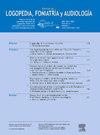User profiles and auditory-perceptual evaluations upon the launch of the All-Voiced app for voice evaluation: Initial insights and training potential
Q3 Nursing
引用次数: 0
Abstract
Introduction
Auditory-perceptual evaluation is key for diagnosing voice disorders, but variability in judgments underscores the need for improved training materials. The All-Voiced app was developed to enhance consistency in evaluations through real-time feedback and data-driven training.
Objective
To present preliminary findings from the first 75 days following the launch of the latest version of the app (September 2024), focusing on user profiles and voice evaluations, exploring the app's potential for deeper insights as more data is gathered.
Method
The latest version of the All-Voiced app, launched in September 2024, includes a fully integrated backend for data collection from users who provide consent. The app enables users to practice voice evaluations, receive feedback, and contribute to research. Descriptive statistics were used to analyze user profiles and evaluations from the first 75 days post-launch of this latest version. Box plots and scatter plots were used to compare the evaluations of All-Voiced users with PVQD ratings (Walden, 2022) across different competence levels.
Results
A total of 264 participants registered in the app, with daily registration patterns showing consistent activity. Most participants were aged 21–30 (49%), identified with “she/her” pronouns (88%), and were from the United States (51%). The majority were speech-language pathologists (78%), and 40% were beginners in terms of competence level. A total of 557 evaluations were collected across 112 voice samples. Analysis of the three most frequently evaluated voice samples revealed distinct patterns of consensus among evaluators with varying levels of expertise, hinting at trends that could have significant implications as more data is collected.
Conclusion
The All-Voiced app has been well received, particularly by speech-language pathologists, highlighting its promise as a tool for auditory-perceptual training. By collecting and analyzing large-scale data, the app holds potential to address limitations in the subjective nature of evaluations, enhance reliability, and support evidence-based practices in voice disorders management.
全语音评估应用上线后的用户档案和听觉感知评估:初步见解和培训潜力
听力-知觉评估是诊断声音障碍的关键,但判断的可变性强调了改进训练材料的必要性。开发all - voice应用程序是为了通过实时反馈和数据驱动的培训来提高评估的一致性。目的介绍最新版本app(2024年9月)发布后75天的初步调查结果,重点关注用户资料和语音评估,随着收集到的数据越来越多,探索app的潜力,以获得更深入的见解。最新版本的all - voice应用于2024年9月推出,包括一个完全集成的后端,用于从提供同意的用户那里收集数据。该应用程序允许用户练习语音评估,接收反馈,并为研究做出贡献。我们使用描述性统计来分析这个最新版本发布后75天内的用户概况和评价。使用箱形图和散点图比较了不同能力水平的全语音用户与PVQD评分(Walden, 2022)的评价。结果共有264名参与者在应用程序中注册,每日注册模式显示一致的活动。大多数参与者年龄在21-30岁之间(49%),人称“她/她”(88%),来自美国(51%)。以语言病理学家居多(78%),能力水平为初学者的占40%。总共收集了112个语音样本的557个评价。对三个最常被评估的声音样本的分析揭示了不同专业水平的评估者之间的不同共识模式,暗示了随着收集更多数据可能产生重大影响的趋势。all -浊音应用程序受到了广泛的欢迎,尤其是在语言病理学家中,这凸显了它作为听觉感知训练工具的前景。通过收集和分析大规模数据,该应用程序有可能解决评估主观性质的局限性,提高可靠性,并支持声音障碍管理的循证实践。
本文章由计算机程序翻译,如有差异,请以英文原文为准。
求助全文
约1分钟内获得全文
求助全文
来源期刊

Revista de Logopedia, Foniatria y Audiologia
Nursing-LPN and LVN
CiteScore
1.10
自引率
0.00%
发文量
28
 求助内容:
求助内容: 应助结果提醒方式:
应助结果提醒方式:


